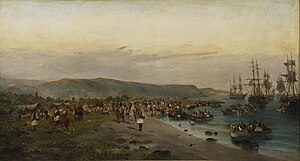Battle of Phaleron
| Battle of Phaleron | |||||||
|---|---|---|---|---|---|---|---|
| Part of the Greek War of Independence | |||||||
 Karaiskakis landing at Faliron by Konstantinos Volanakis |
|||||||
|
|||||||
| Belligerents | |||||||
|
|
|
||||||
| Commanders and leaders | |||||||
|
Lord Cochrane Sir Richard Church Georgios Karaiskakis † |
Reşid Mehmed Pasha | ||||||
| Strength | |||||||
| 3,000 | Unknown (some cavalry) | ||||||
| Casualties and losses | |||||||
| 2,000 | Unknown | ||||||
The Battle of Phaleron took place on April 24 (6 May Gregorian ), 1827. The Greek rebel forces were being besieged inside the Acropolis of Athens by Ottoman forces under the command of Mehmed Reshid Pasha. Greek forces outside the city were desperately trying to break the siege.
The Scottish Admiral Lord Cochrane and Irish General Richard Church were nominally commanding the Greeks. 3,000 men were ordered to advance across the plain. Their plan was to send 7,000 more men who were at Piraeus to attack the Turks from the flanks. As the Greeks advanced from Phaleron, Reshid sent some cavalry to attack the Greeks. He expected the main assault to come from Piraeus. The troops from Piraeus did not arrive and the rest of the Greeks were attacked by the Turkish cavalry.
The Greeks lost either 1,500 or 2,000 men, which was a devastating setback. The men in the Acropolis surrendered on 5 June and were escorted by the French army to the coast. This defeat destroyed Greek morale and the only places on mainland Greece that persevered after the battle were Mani and Nauplio.
The Greeks had also lost their commander Karaiskakis from wounds suffered a few days before the battle.
Later that year, the Great Powers, Imperial Russia, the restored kingdom of France, and Great Britain destroyed the Egyptian and Ottoman fleets in the Battle of Navarino.
Coordinates: 37°56′00″N 23°42′00″E / 37.9333°N 23.7000°E
...
Wikipedia
